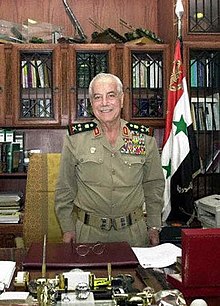Mustafa Tlas
| Mustafa Tlass مصطفى طلاس |
|
|---|---|

Mustafa Tlass in his office in Damascus
|
|
| Minister of Defense | |
|
In office March 1972 – 12 May 2004 |
|
| President |
Nureddin al-Atassi (1968-1970) Ahmad al-Khatib (1970-1971) Hafez al-Assad (1971-2000) Bashar al-Assad (2000-2004) |
| Preceded by | Hafez Assad |
| Succeeded by | Hasan Turkmani |
| Chief of Staff of the Syrian Army | |
|
In office 1968–1972 |
|
| Preceded by | Ahmad Suwaydani |
| Succeeded by | Yusuf Shakkur |
| Member of the Regional Command of the Syrian Regional Branch | |
|
In office 28 September 1968 – 9 June 2005 |
|
|
In office 4 April 1965 – December 1965 |
|
| Personal details | |
| Born |
Mustafa Abdul Qadir Tlass 11 May 1932 Rastan, French Mandate of Syria |
| Died | 27 June 2017 (aged 85) Paris, France |
| Nationality | Syrian |
| Political party |
Arab Socialist Ba'ath Party – Syria Region of the Arab Socialist Ba'ath Party Was a member of the original Ba'ath Party and its Syrian Regional Branch until 1966 |
| Relations |
Manaf Tlass (son) Firas Tlass (son) Abdul Razzaq Tlass (nephew) |
| Military service | |
| Allegiance |
|
| Service/branch | Syrian Army |
| Rank |
|
Mustafa Abdul Qadir Tlass (Arabic: مصطفى طلاس; 11 May 1932 – 27 June 2017) was a Syrian senior military officer and politician who was Syria's minister of defense from 1972 to 2004. He was part of the four-member Regional Command during the Hafez Assad era.
Tlass was born in Rastan near the city of Homs to a prominent local Sunni Muslim family on 11 May 1932. His father, Abdul Qadir Tlass, was a minor Sunni notable who made a living during the Ottoman period by selling ammunition to the Turkish garrisons. On the other hand, members of his family also worked for the French occupiers after the First World War. His paternal grandmother was of Circassian origin and his mother was of Turkish descent. Tlass is said to also have some Alawite family connections through his mother. He received primary and secondary education in Homs. In 1952, he entered the Homs Military Academy.
Tlass joined the Ba'ath Party at the age of 15, and met Hafez al-Assad when studying at the military academy in Homs. The two officers became friends when they were both stationed in Cairo during the period of 1958-1961 United Arab Republic merger between Syria and Egypt: while ardent Pan Arab nationalists, they both worked to break up the union, which they viewed as unfairly balanced in Egypt's favor. When Hafez al-Assad was briefly imprisoned by Nasser at the breakup of the union, Tlass fled and rescued his wife and sons to Syria.
During the 1960s, Hafez al-Assad rose to prominence in the Syrian government through the 1963 coup d'état, backed by the Ba'ath party. He then promoted Tlass to high-ranking military and party positions. In 1965, while he was Ba'athist army commander of Homs, Lieutenant Colonel Mustafa Tlass arrested his pro-government comrades. A 1966 coup by an Alawite-dominated Ba'ath faction further strengthened al-Assad, and by association Tlass. Tensions within the government soon became apparent, however, with al-Assad emerging as the prime proponent of a pragmatist, military-based faction opposed to the ideological radicalism of the dominant ultra-leftists. Syrian defeat in the 1967 Six Day War embarrassed the government, and in 1968 al-Assad managed to install Tlass as new Chief-of-Staff. After the debacle of an attempted Syrian intervention in the Black September conflict, the power struggle came to open conflict.
...
Wikipedia
